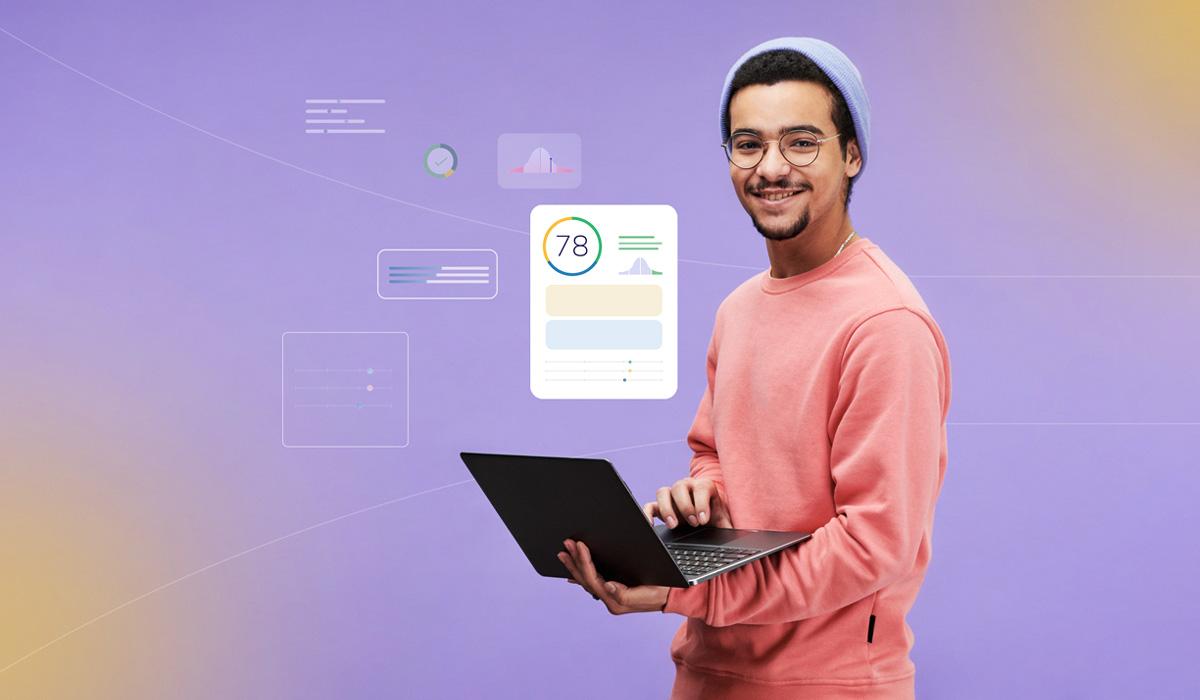Finding the perfect candidate isn’t just about identifying a new hire’s skills or finding someone with relevant experience. It’s about finding the employee with the right aptitudes and working styles to thrive in your culture and team. This is where a personality assessment for job fit can be incredibly valuable.
But how do you find these high-fit employees?
While resumes are good at listing skills and experience, it’s the unseen qualities — cultural fit, intrinsic motivation, and values — that ignite engagement and propel productivity. These “intangibles” are essential for a good hire. That’s where work personality tests come in.
Personality assessments can help you gauge individuals’ true fit for your role, team, and culture. In this blog, we explore the purpose and different types of personality assessments that can help you see beyond the resume to predict performance.
We’ll Cover:
- What is a personality assessment for a job or an employment personality test?
- How are personality assessments for jobs used in the hiring process?
- What are the different types of personality assessments?
- The benefits of personality assessments for hiring
- Limitations of personality assessments for jobs
- How to implement personality assessments in your hiring process
- How to interpret personality assessment results
- How to use personality assessment for employee development
- How Wonderlic helps hire and develop employees
- FAQs
What is a personality assessment for a job or an employment personality test?
Personality assessments come in many forms, including questionnaires and assessments with text- or image-based questions. However, most personality tests are not designed for the workplace but rather shed light on an individual’s general tendencies or communication styles.
Personality assessments for jobs are similar to other personality assessments in that they’re backed by leading psychology. However, they differ in that they’re specifically focused on assessing personal and interpersonal dynamics in the workplace, such as general temperament, ability to work in a team, and behavioral tendencies. Personality assessments in the workplace differ from other types of pre-hire assessments — such as skills or cognitive ability tests — because they don’t have any right or wrong answers. The answers from a personality test are designed to illustrate a personality profile. Some profiles are more suited to certain types of work than others.
In addition, employment personality assessments shed light on a candidate’s preferred ways of collaborating with others. This deeper understanding of individuals can also provide a helpful head start on post-hiring employee management and development. When combined with insights into cognitive ability and motivation, these tests solidify your hiring team’s decision by predicting on-the-job behavior and ensuring a strong cultural fit.
According to research from Cambridge, multi-measure pre-hire assessments that include personality, cognitive ability, and motivation are among the most highly effective and accurate predictors of on-the-job performance.
How are personality assessments for jobs used in the hiring process?
Remember: You don’t hire resumes. You hire people. While resumes offer a valuable glimpse into a candidate’s experience, experience doesn’t paint the whole picture. That’s because resumes don’t necessarily reveal the quality of that experience or anything about a candidate’s communication patterns.
That’s where employment personality assessments come in. They provide employers with a deeper understanding of who they’re hiring and how they’ll fit into the organization.
Don’t underestimate a strong cultural fit. It ensures a candidate’s personality, work style, and values mesh with your company’s work environment, creating a sense of belonging and synergy that fosters teamwork, communication, and collaboration, ultimately leading to a more engaged and productive workforce.
The use of personality assessments supports everyone involved in the hiring process:
- Recruiters and hiring managers can spend less time sifting through resumes and identify top talent more efficiently. Assessments help narrow the pool to best-fit candidates, saving valuable time and resources.
- Candidates also experience a more holistic hiring process where they can showcase why they’d be a good fit for a role based on not just experience but also their natural tendencies and approach to work. This can lead to a more positive candidate experience, especially for those who excel in areas not readily apparent on a resume.
What are the different types of personality assessments?
Some personality tests are more fad than science, for example, online personality tests that reveal which Disney villain you are or which Hogwarts House you belong to. These tests are purely for entertainment purposes, not employment purposes. The effectiveness of a personality test boils down to its underpinning psychology and science. Business personality assessments specifically reveal insights about someone in a work setting. Some may reveal communication style and team dynamics. Others may categorize candidates into specific personality types that don’t necessarily align with specific roles or the workplace.
Below, we explore several common personality assessment tests:
Big Five Model
The Five-Factor Model, also known as the Big Five personality assessment or OCEAN Model, is a cornerstone of the most reliable personality assessment tests for employment (and it’s also the model Wonderlic uses for the personality portion of its multi-measure assessment). This widely trusted framework measures five key dimensions of personality: Agreeableness, Conscientiousness, Extroversion, Openness to Experience, and Emotional Stability. Industrial-organizational (I/O) psychology research has identified these dimensions as the most comprehensive and predictive for understanding workplace behavior.
MBTI
The Myers-Briggs Type Indicator (MBTI) is another well-known personality test that measures how individuals perceive the world and make decisions. Unlike personality assessments for jobs, which directly evaluate role-specific skills, MBTI focuses on personality preferences and tendencies. It categorizes people into 16 types based on four binary dimensions (e.g., extroversion vs. introversion, sensing vs. intuition). These combinations create unique personality codes, offering valuable insights for personal growth and team dynamics.
Important to Note: MBTI is not designed to assess job skills or predict workplace performance. Other types of work personality tests like Wonderlic focus on areas directly related to job success, providing hiring managers with targeted insights into a candidate’s cognitive abilities and potential fit for the role.
Learn more about Wonderlic Vs. MBTI
DiSC
The DiSC assessment is another common personality test that offers valuable insights into behavioral styles. These behavioral styles are important for team dynamics but are not necessarily tied to job skills or performance metrics. They shed light on how individuals interact, communicate, and collaborate within a team.
Important to Note: While DiSC provides valuable personal development insights, the DiSC website acknowledges it as “not validated for hiring use” because it doesn’t directly measure job-specific skills, aptitudes, or other critical factors for any specific position
Learn more about Wonderlic Vs. DiSC
The benefits of personality assessments for hiring
Imagine onboarding a seemingly qualified candidate, only to discover they clash with colleagues and lack initiative. That’s the risk of hiring solely on resumes. In addition, the cost of a bad hire can be staggering, impacting team morale, productivity, and your bottom line (the cost of a single bad hire averages $17,000, but the true cost can leap to $240,000 when you factor in recruiting fees, onboarding expenses, and lost productivity).
Personality assessment tests for employment offer a powerful tool to move beyond resumes and build a high-performing team by answering critical questions about your candidates: Will they thrive in your company culture? Do their values align with yours? And can they work effectively with others and contribute to a positive team dynamic?
By incorporating personality assessments into your hiring process, you can reduce turnover, enhance employee engagement, and improve hiring efficiency.
Let’s take a deeper look at the benefits of business personality assessments.
Reduce turnover, save money, and build a stronger team
Glassdoor research found that companies that prioritize cultural fit in the hiring process see a 20% reduction in turnover rates. Business personality assessments go beyond simply identifying strengths and weaknesses. They act as a roadmap to building a truly collaborative team. By understanding a candidate’s personality and cultural fit, you can significantly reduce the risk of a bad hire and its associated costs.
Improve teamwork with the combined strengths of diverse personalities
Imagine a team where the analytical thinker meticulously plans while the creative problem solver brings fresh ideas to the room. By revealing individual communication styles, work preferences, and unique talents, personality assessments for work foster a deeper understanding and appreciation for each team member’s strengths.
Drive engagement and productivity
Personality assessments in the workplace can help identify hidden potential. Beyond an employee’s ability to perform their responsibilities, how can their personality and working style elevate (or hinder) the team? Improved teamwork and communication, facilitated by personality assessment, can lead to a collaborative environment with less conflict and wasted time. Plus, when employees feel that their personalities are understood and valued, they develop a powerful sense of belonging and purpose.
Empower growth and foster internal mobility
Work personality tests go beyond hiring the right external candidate; they can also become a powerful tool for internal mobility. By understanding employees’ strengths and working styles, you can identify hidden gems within your organization who can excel in open roles. The company saves on recruitment costs and onboarding time while employees feel valued and engaged.
Limitations of personality assessments for jobs
As we mentioned earlier, some personalized tests are more fad than science. While these tests might tell you which Star Wars character you most resemble, they don’t correlate with the workplace or specific roles.
If you’re considering using personality assessments in the workplace, choose well-established, scientifically validated tests that are specifically built to help predict on-the-job performance. Here are a few things to watch out for when choosing your pre-hire personality assessment:
- Lack of nuance: Popular online tests like MBTI and DiSC, while widely available, lack the depth and specificity to accurately inform hiring decisions. Their interpretations can be subjective and based on limited research. Additionally, some tests present personality as something binary (introverted vs. extroverted), while in reality, traits exist on a spectrum, making these tests less effective in capturing subtle nuances.
- Pseudoscience: Tests like the Enneagram, despite being intriguing, lack the scientific rigor required for reliable hiring assessments. They categorize personalities into rigid types and offer little insight into job performance.
The self-reporting challenge:
Personality tests inherently rely on self-reported information, which can be influenced by current mood, life situations, or even the time of day when an employee takes the test. This opens the door to “gaming” these assessments. However, the most scientifically validated personality tests, like the Big Five Model, include safeguards to detect abnormalities, such as a candidate trying to create an overly favorable impression (also known as impression management).
The problem with a one-dimensional view:
For the most accurate hiring decisions, personality tests should be used alongside other pre-hire assessments, such as cognitive ability and motivation assessments and structured interview questions. Otherwise, you may get unreliable results.
For example, let’s say you’re hiring a data analyst. A candidate aces your work personality test, scoring highly in areas like “teamwork” and “communication.” They exude confidence during the interview, making you believe they’d be a great addition to the team. However, upon hiring them, you discover their analytical skills are lacking, and they struggle to grasp complex data sets. Their strong personality overshadowed their weaker technical abilities, leading to a poor overall fit for the role.
With multi-measure assessments like Wonderlic, work personality tests become a valuable piece of the puzzle, complemented by evaluations of job-specific hard and soft skills and overall mental capabilities.
How to implement personality assessments in your hiring process
Employment personality assessments can be a powerful tool to find hidden talent and build stronger teams, but successful implementation requires a strategic approach. Here’s what you need to consider when choosing and implementing a personality assessment for work.
Choosing the right assessment
- Focus on job relevance: Don’t use a generic personality test. Instead, select an assessment that directly evaluates traits crucial for the specific role you’re filling.
- Scientific backing: Look for tests grounded in established models like the Big Five Model.
- User experience matters: Provide a smooth candidate experience by choosing an assessment with clear instructions, user-friendly design, and minimal room for subjective interpretation.
How to start using personality assessments
Next, it’s important to think through how you’ll use your chosen employment personality assessment. For example, you may use it at the start of your hiring process to quickly screen out candidates for roles where certain personality types are essential, such as customer service or sales professionals. Or, you may use it at the end of your hiring process to help decide between finalists.
We recommend using it at the start of your hiring process so you can focus your recruiting efforts on the top 10% or so of candidates. As for administering the test, ideally, the candidate is not given any priming or suggestions before the test. Rather, they would simply read the test’s instructions and answer the questions. Any framing beforehand can lead to the candidate taking the assessment with an altered mindset. Scientifically-backed personality tests like Wonderlic’s are calibrated on candidates not having any extra framing.
After candidates have taken the test, you can inform them that while personality assessment tests for employment are a valuable tool in the hiring decision, they’re not the sole determining factor.
By strategically implementing personality assessments in the workplace alongside interviews, cognitive ability and motivation assessments, and reference checks, you can create a well-rounded picture of each candidate. This standardized process helps you focus on identifying potential strengths and weaknesses relevant to the job, ensuring the assessment guides your decision, not dictates it. Remember to train hiring managers to interpret assessment scores objectively to avoid bias.
How to interpret personality assessment results
It’s essential to learn how to decipher the results of business personality assessments so they don’t feel like a foreign language. Let’s explore how to interpret them using the Five-Factor Model (Big Five Model) as a framework. This widely used model evaluates core personality traits that influence job performance.
The personality fit score reflects how well your natural tendencies align with the job requirements. Here’s a breakdown of what it might tell you:
Strong fit (high scores):
This indicates a potential dream match! These individuals likely:
- Thrive in the role: Their natural behaviors and work style align seamlessly with the job’s demands, leading to high job satisfaction.
- Excel in performance: They’re well-suited to the work environment and required behaviors, potentially exceeding expectations.
- Feel connected: The work itself feels like an extension of who they are, fostering a sense of purpose and fulfillment.
What to look for next: For candidates with a strong fit score, look deeper into their cognitive abilities and motivations. Since their personality aligns well, assessing specific skills and relevant experience to the job gets you closer to making a final hiring decision.
Weak fit (low scores):
This suggests a potential mismatch. Here’s what it might indicate:
- Lower job satisfaction: The role’s demands might clash with their natural tendencies, leading to frustration and a lack of fulfillment.
- Performance challenges: Behaviors required for the role may not come naturally, making it difficult to achieve positive outcomes.
- Disengagement: The work environment and tasks may not align with their preferred way of working, leading to a sense of disconnection.
Remember, the personality fit score is just a starting point. Be sure to consider it alongside motivation, adaptability, and a candidate’s desire to learn and grow within the role. You may want to consider alternative roles for the applicant, better matching their personality profile and natural tendencies.
How to use personality assessment for employee development
The evaluation process for candidates can also be a springboard for employee development. By measuring an employee’s personality and natural tendencies, you can identify areas for career advancement. For example, a customer service representative who demonstrates high scores in conscientiousness and problem-solving could thrive in a training and development role. In this case, personality assessments in the workplace empower employees with a roadmap for professional growth.
In practice, identifying future roles for your employees means having a deep understanding of their strengths and weaknesses. By evaluating an employee’s fit for a new role, you can help them gain valuable self-awareness that empowers them to identify areas for improvement. After all, if someone doesn’t?
How Wonderlic helps hire and develop employees
Every company needs a comprehensive understanding of who they’re hiring, from their personalities to their motivation and potential — a candidate’s unique blend of traits that will make them successful in a specific role and within your culture.
That’s where multi-measure assessments like Wonderlic Select come in. Wonderlic goes beyond traditional work personality tests by providing insights into a candidate’s potential, cultural fit, and job-specific strengths and weaknesses. Wonderlic analyzes multiple dimensions of a person, including personality, to give you the insights you need to make the right hiring decision the first time, every time.
By incorporating cutting-edge industrial-organization psychology, Wonderlic measures:
- Cognitive ability: A candidate’s capacity to learn, solve problems, and adapt to new situations. (This answers: Can they do the job?)
- Motivation: Reveals a candidate’s internal drives, ensuring they are in line with your company’s culture and the demands of the role. (This answers: Do they want to do the job?)
- Personality: Provides valuable insights into a candidate’s working style, communication preferences, and potential for collaboration. (This answers: How will they do the job?)
Wonderlic Develop, a scalable self-led employee development tool, also helps employees improve their performance post-hire. Develop provides insights that help employees understand their natural tendencies and potential blind spots — it reveals employees’ “high-effort” and “low-effort” traits relative to their current roles. These specific, actionable insights provide a personalized roadmap for development, prioritizing high-impact traits and competencies that directly and immediately improve performance.
Get a demo of Wonderlic today
Today’s hiring landscape is complex. If you’re tired of the same old hiring process yielding poor results, let Wonderlic help you eliminate the guesswork and assemble stronger, more resilient teams to achieve your business goals.
Ready to experience the predictive power of Wonderlic? Get your free demo today and see how our assessments can reshape your hiring process.
FAQs
Personality assessments come in many forms, including questionnaires and assessments with text-based or image-based questions. However, most personality tests are designed to reveal an individual’s natural tendencies or communication styles, not workplace-specific qualities. In contrast, work personality tests focus on assessing traits relevant to the workplace, such as interpersonal preferences, temperament, and behavioral tendencies.
The Five-Factor Model, also known as the Big Five Model, is a very common personality assessment (and it’s also the model Wonderlic uses for the personality portion of its multi-measure assessment). This widely trusted framework measures five key dimensions of personality — Agreeableness, Conscientiousness, Extroversion, Openness to Experience, and Emotional Stability — to predict and understand workplace behavior.
Some personality tests reveal communication style and potential team dynamics. Others may bucket candidates into specific personality types that aren’t tied to specific roles. Therefore, we recommend the Five-Factor Model, also known as the Big Five Model. Industrial-organizational (I/O) psychology research has identified these dimensions as the most comprehensive and predictive for understanding workplace behavior.
First, we recommend visiting our candidate page, which offers FAQs, practice tests, and preparation guides. Second, remember that most personality tests do not have right or wrong answers; they aim to reveal your working style and help you determine your best fit in the organization.







